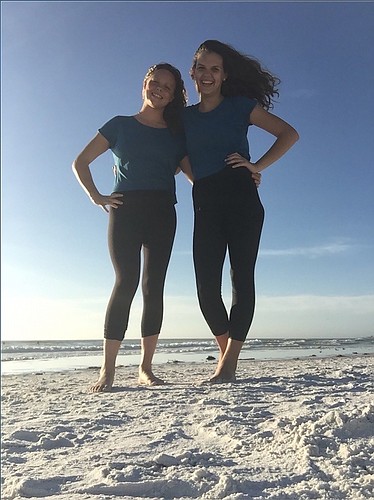- April 22, 2025
-
-
Loading

Loading

As individuals, The Out-of-Door Academy’s Reece Whatmore and Harper Campbell have a passion for helping clean local waterways and making a sustainable change in the environment.
Whatmore, a senior, has been working on an oyster research project in which she makes oyster reefs to decrease harmful chemicals and algae that produce red tide.
Campbell, a sophomore, is working to build up the reefs and has done research on coral fragmentation and coral gardening.
Together, Whatmore and Campbell are serving as EarthEcho Water Challenge Ambassadors to build awareness and involvement in protecting local water resources.
The ODA students are two of 50 ambassadors in the national program.
“It’s great to be surrounded by people who are also so passionate about the same thing,” Campbell said. “We just kind of nerd out.”
As ambassadors, Whatmore and Campbell are tasked with monitoring local waterways and importing their data into a database for anyone to use, attending a virtual summit, blogging about their experiences and hosting an event that teaches a group of about 20 about water quality.
On Sept. 17, Whatmore and Campbell virtually taught a class of third graders at ODA’s Lower School about water quality testing and demonstrated how to conduct a test. The third graders had the opportunity to conduct their own tests using materials and resources Whatmore and Campbell provided through EarthEcho.
Campbell and Whatmore chose third grade because students are learning about marine biology, and they hoped to inspire younger students to get involved in protecting the environment.
“I feel like right now people are trying to figure out ways to get plastics out of the ocean, but I feel we need to find ways to prevent it from going into the ocean in the first place,” Campbell said. “That’s all about habits, and if you can start enforcing habits when they’re young, then it’s a better chance for them to stick with it.”
Whatmore and Campbell discussed with the class what they can do to minimize the use of single-use plastics and why it’s important to protect the oceans. The students also signed a pledge sharing one act they can do to help protect the ocean.
“An important takeaway for the kids is to understand that at the end of the day, we’re not just doing this for the dolphins and the sea turtles, but it’s for all of us,” Whatmore said.
Campbell enjoyed seeing the students’ reactions to the test results, such as when the pH tables changed the color of the water.
Whatmore and Campbell also founded the Gulf Protection Pledge, which is committed to working with local restaurants to encourage environmentally friendly practices and reduce usage of single-use plastics.
COVID-19 has put a hold on their work with the Gulf Protection Pledge, though, because the girls are aware the restaurant industry has taken a hit as a result of the pandemic.
When the pandemic slows or stops, Whatmore and Campbell hope to compile a list of restaurants with environmentally friendly practices and encourage other restaurants to implement these practices. Some of the practices include using paper straws, not using plastic utensils and using environmentally friendly takeout containers.